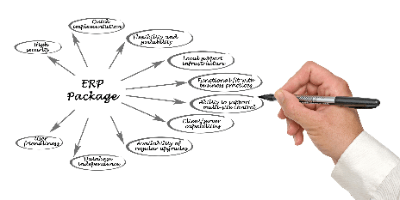What Is an ERP Package?
 An ERP (Enterprise Resource Planning) Package is a system that integrates and manages the various operations of a company.
An ERP (Enterprise Resource Planning) Package is a system that integrates and manages the various operations of a company.
ERP packages provide functions such as accounting management, sales management, logistics management, production management, and human resource and payroll management on a single system platform, enabling the centralization of information within a company. This facilitates information sharing and business collaboration between departments, improving operational efficiency and speed.
In addition, ERP packages standardize business processes, reducing the number and variation of employees, and contributing to improvements in quality and costs. Furthermore, management can make accurate decisions because they can monitor the status of each department and company-wide performance in real time.
Because ERP packages can be operated on a company-wide scale, they can also optimize facilities and human resources, making ERP packages an indispensable system for improving a company’s competitiveness.
Uses of ERP Packages
ERP Packages are used to streamline operations such as accounting, production, sales, logistics and human resources. Because the information required by each department and the methods of handling information differ greatly, the core business operations of a company have been managed by individual systems introduced for each department, and information has been processed in independent databases for each department.
However, when considered through the entire flow company operations, all of this separate business information from different departments is all related, as the information must ultimately be integrated into the accounting operations.
In the past, it took time, effort, and cost to cross over the databases of each separate department to reflect payroll information from human resource management or purchase sales information from sales management in the accounting process.
By implementing an ERP package, business management for each separate department can be linked and operated efficiently.
Principle of ERP Packages
Core systems refer to the various systems that support a company’s main business operations. They are called business systems or back-office systems, and are generally independent systems for each individual business.
However, separate mission-critical systems, which were created by different departments for their own convenience, had great difficulty in integrating necessary data, and could only handle each other’s data in a partial and fragmented manner. In today’s business world, where real-time, rapid, and accurate analysis of management data is critical, this problem can lead to significant losses.
In contrast, ERP packages do not require any linkage processing because multiple mission-critical systems are integrated in advance, and the databases and master data are handled in a single integrated manner from the beginning. Real-time, centralized data analysis is possible.
ERP Packages not only eliminate the time and cost of exchanging data across different departments, but also provide the information necessary to understand the company’s business situation in real time, quickly and accurately. This enables corporate management to make the best decisions necessary to improve management more accurately and more quickly than ever before.
Types of ERP Packages
1. On-Premise ERP Packages
A server is installed in the company where the ERP package is installed, the system is built, and is operated in-house. This type of system allows flexibility in the development of additional functions tailored to the company’s needs, and it is highly secure because it utilizes the company’s internal network.
On the other hand, the company must pay all initial costs such as the purchase of servers and maintenance costs such as personnel expenses for maintenance, and costs tend to increase.
2. Cloud-Based ERP Packages
This type of ERP package can be used over the Internet without installing a server in the company. It can be operated anytime and anywhere as long as there is an Internet connection. Since a server is not required, the introduction period is shortened and initial and operating costs are reduced.
On the other hand, since an Internet environment is always required, it may not be available in the event of a network failure. Furthermore, since all information is managed over the Internet, the possibility of information leakage must be considered.
3. Hybrid ERP Packages
There is also a hybrid type that utilizes the advantages of both on-premise and cloud computing, in which functions that contain important confidential information are operated on-premise, and data that is safe to have on the network is used in the cloud computing type.
Other Information on ERP Packages
ERP Package Market Trends
Recent trends in the ERP package market show that sales of package licenses are on the rise. Some analysts believe that DX (transformation of operations and business through the use of digital technology) has driven the expansion of the market, and ERP is being used more and more.
In addition, the use of cloud-based ERP packages has rapidly increased as teleworking and non-face-to-face business operations have been encouraged in recent years.